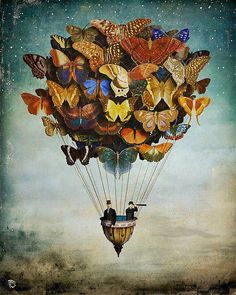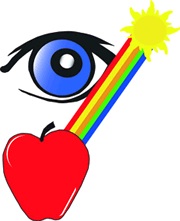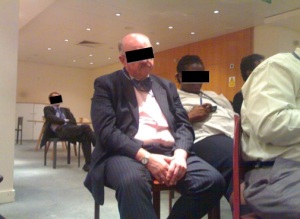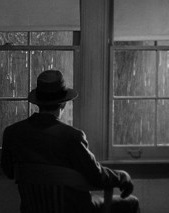
Human organisms are motivated by psychological drives. A psychological drive is “an innate, biologically determined urge to attain a goal or satisfy a need” (Oxford). If you are hungry, for example, wanting to eliminate or reduce the unpleasant state of hunger is what drives you.
The psychiatrist Sigmund Freud (1856-1939) theorized that we have two drives: a drive toward life—includes instinctual impulses to have sex, eat, drink and need for fun (see: Pleasure Principle)—and a drive toward death—includes anti-social behaviour, anger, aggression, hate and violence (good times).

From these drives Freud theorized that personality is a system of three interconnected parts: Id (instinctual part: “Give me now”), Ego (realistic part: “No, I don’t think so”) and Superego (moral conscience part: “You should be ashamed!”).
Id, Ego and Superego are a translation of Es (it), Ich (I) and Ueber-Ich (Over-I). Id is like a horse. Ego is the rider and Superego lambastes Ego for trespassing. As your “ideal” self, Superego conforms to society and prohibits unethical behaviour (Simply Psychology).

Freud saw ego as a good thing. Ego negotiates between human impulses and social standards. There are, however, other ways to look at it.
Cue music: Edward Sharpe and the Magnetic Zeros, “Man On Fire”.
As a ‘me’ ‘mine’ and ‘for myself,’ we consider ourselves distinct from the world, but if you look closely, you realize: it isn’t true.
If you want inner peace, break free of what Freud says.

Garry Shandling (1949-2016)—a comedian who made loneliness and self-hate funny before turning it into love for the world—said before he died (obviously):
“All my journey is to be authentically who I am. Not trying to be somebody else under all circumstances. The whole world is confused because they’re trying to be somebody else. To be your true self it takes enormous work…. Ego drives the world. Ego drives the problems. So you have to work in an ego-less way. Egolessness, which, is the key to being authentic, is a battle” (The Green Room).
In spiritual circles ego is seen as an enemy and a synonym for “selfishness.”
Psychological drives operate on a feedback control system similar to a thermostat. When a need is satisfied, the drive is reduced. We relax. Eliminate a drive completely and a state of mental balance or psychological equilibrium is obtained.

When we’re calm and comfortable, that’s room temperature. When our emotional temperature changes, we feel tension and an instinctive response to potential conflict.
Some people perpetuate unpleasant states for purposes of enjoyment. They eat when not hungry, drink when not thirsty and enjoy death defying activities like skydiving and the thrill of almost dying (source).
Some people have a drive for money, power and or fame but such people experience an unpleasant state of dissatisfaction when they realize: externals don’t matter.

This is hungry ghost territory. This is, as Gabor Maté, M.D., said,
“where we seek something outside ourselves to curb an insatiable yearning for relief or fulfillment.
The aching emptiness is perpetual because the substances, objects or pursuits we hope will soothe it are not what we really need.
We don’t know what we need, and so long as we stay in the hungry ghost mode, we’ll never know. We haunt our lives without being fully present” (Hungry Ghosts).
But, don’t worry. It’s normal.
As one seeks to survive in a culture of consumption and comparison in the midst of mass advertising, it’s only natural to want more than is possible. If you get hungry ghost-like—take a deep breath and ask yourself: “Do I have what I need?”
The psychiatrist Shoma Morita (1874-1938) proposed two other drives: a drive to live fully and a drive for comfort and security. Sometimes these drives are at odds.

With eyes on a need yet achieved, there is anxiety and self-doubt. Such feelings cannot be avoided. Emotions are messages.
Avoid or suppress feelings and you disrupt your ability to function. For example, if you are anxious in social situations, the inclination is to avoid them, but avoidance perpetuates a lack of confidence and the very anxiety one is trying to escape. Self-confidence comes with experience. Understand a feeling and take action if need be (source).
Some of us have drives that are difficult to satisfy. Sometimes a drive takes over and we are driven.
The question is: Where are we going?

Many humans—many, many humans probably (in fact)—experience a constant dissatisfaction with life. Their minds have made a judgment: Life is not the way it should be.
But why?
It could be that we experience dissatisfaction with life “as it is” because in comparison to life imagined, the life we live falls short of expectations. We try to make life match our ideal by noticing what’s wrong and making changes, but when we achieve what we want, we imagine how life could be even better. We think that once we fix what’s wrong, we’ll be satisfied, but when the “future” arrives, it’s just another dissatisfying moment.

It’s rare for people to feel a deep satisfaction with the way things are. We live as if the present moment is a barrier to the life we’d rather be living. The future we dream of never arrives and herein is the human conundrum.
Most of us live in a world of make-believe—even though we know life isn’t a fairy story. Most of us live a mundane existence in stark contrast to our make-believe world, but take heed: Reality does exist and it’s better than make-believe.
Reality is a world of opportunity, happiness and peace of mind. You might be content within a comfort zone of normal life—happy to take out the garbage, do laundry or whatever (all good stuff)—but there are degrees of happiness.
You could be only scratching the surface. Pay attention to what it feels like or sounds like to be here and now. Do this and you are taken from make-believe to a direct experience of reality. You start seeing, feeling, hearing, smelling and tasting the present in a way that you haven’t done since you were a kid.
Like Boston (the band, not the city) said, “People livin’ in competition. All I want is to have my peace of mind, yeah, whoa” (“Peace of Mind“).
Yeah. Whoa. That’s it precisely.






 You’re up before the sun “working in a coal mine, going down down,” and someone says, “Lord! I am soooo tired. How long can
You’re up before the sun “working in a coal mine, going down down,” and someone says, “Lord! I am soooo tired. How long can  But few people see signs these days and those who do are maligned. We might crave a vision but all we have is TV. It’s not because the signs aren’t there that we don’t see them.
But few people see signs these days and those who do are maligned. We might crave a vision but all we have is TV. It’s not because the signs aren’t there that we don’t see them.


 No sooner do you have this realization when you see a sign. But it isn’t the sign that catches your attention. It’s the sign spinner. Stopped at a streetlight, you watch the sign spinner. Suddenly life doesn’t seem so bad.
No sooner do you have this realization when you see a sign. But it isn’t the sign that catches your attention. It’s the sign spinner. Stopped at a streetlight, you watch the sign spinner. Suddenly life doesn’t seem so bad. What you thought was going to be “one of those days” changes into something beautiful when you open yourself to connection and possibility.
What you thought was going to be “one of those days” changes into something beautiful when you open yourself to connection and possibility. Jump forward: now you’re in a lab cubicle waiting for a nurse to take your blood. You’re listening to the Moody Blues sing “
Jump forward: now you’re in a lab cubicle waiting for a nurse to take your blood. You’re listening to the Moody Blues sing “
 Scientists can explain the mechanics of eyeballs: how they function and how to fix them, but in terms of perception – the link between world “out there” as taken in by eyeballs, and the mind’s interpretation of that world – science can’t say.
Scientists can explain the mechanics of eyeballs: how they function and how to fix them, but in terms of perception – the link between world “out there” as taken in by eyeballs, and the mind’s interpretation of that world – science can’t say. Think about what you see. As you walk, arms not swinging, looking at your feet, eyes glazed like donuts, imagine that you’re in a silent helicopter or a
Think about what you see. As you walk, arms not swinging, looking at your feet, eyes glazed like donuts, imagine that you’re in a silent helicopter or a  We each think of ourselves as a subject in a world of objects. We think we have an inner stream of consciousness that babbles, sometimes turbulent, sometimes calm, but are you in the stream, the stream itself or the one looking at the stream?
We each think of ourselves as a subject in a world of objects. We think we have an inner stream of consciousness that babbles, sometimes turbulent, sometimes calm, but are you in the stream, the stream itself or the one looking at the stream? Science tells us we perceive only reflected colours. Red is not “in” an apple. An apple reflects wavelengths that we see as red with our light receptors. Our eyes and brain together “translate light into colour” (
Science tells us we perceive only reflected colours. Red is not “in” an apple. An apple reflects wavelengths that we see as red with our light receptors. Our eyes and brain together “translate light into colour” ( There is a double vision between self and situation. Inside and outside are two sides of one coin. You see through a massive window, not as a thing inside. The world out there comes inside with each step you take forward.
There is a double vision between self and situation. Inside and outside are two sides of one coin. You see through a massive window, not as a thing inside. The world out there comes inside with each step you take forward. And, like a peeping fuzzy duckling, your life is nature’s music without notation.
And, like a peeping fuzzy duckling, your life is nature’s music without notation.

 Self-help is defined as, “the use of one’s own efforts and resources to achieve things without relying on others” (Google).
Self-help is defined as, “the use of one’s own efforts and resources to achieve things without relying on others” (Google). It’s obvious: Each is unique. You are you. Bieber is the Biebs and Beethoven only looks constipated.
It’s obvious: Each is unique. You are you. Bieber is the Biebs and Beethoven only looks constipated. People have a mania for comparing and under or over rating each other. We’re opinion machines.
People have a mania for comparing and under or over rating each other. We’re opinion machines. This has nothing to do with your self. It’s not about you. That is, the thing to do is to forget yourself. Enjoy all you see, hear and feel. No ego. No win. No lose. No success. Be as 24 hour radio: All humility! All the time!
This has nothing to do with your self. It’s not about you. That is, the thing to do is to forget yourself. Enjoy all you see, hear and feel. No ego. No win. No lose. No success. Be as 24 hour radio: All humility! All the time!

 Research psychiatrist and neuroplasticity – conscious use of directed thoughts – expert, Jeffrey Schwartz says, “You Are Not Your Brain.” He explains that the mind or, “directed attention,” changes how the brain sends messages.
Research psychiatrist and neuroplasticity – conscious use of directed thoughts – expert, Jeffrey Schwartz says, “You Are Not Your Brain.” He explains that the mind or, “directed attention,” changes how the brain sends messages.
 It’s not that we want to stop firing, it’s that we want things firing to help us enjoy. The trick to beautiful enjoyments is to realize that what your brain is doing isn’t you, as in: “Excuse me. That wasn’t me. It was my brain.” Schwartz calls this your “true self” or “wise advocate. You can change your brain effectively through “wise focus of attention.”
It’s not that we want to stop firing, it’s that we want things firing to help us enjoy. The trick to beautiful enjoyments is to realize that what your brain is doing isn’t you, as in: “Excuse me. That wasn’t me. It was my brain.” Schwartz calls this your “true self” or “wise advocate. You can change your brain effectively through “wise focus of attention.” A poet of enjoyment lives in song.
A poet of enjoyment lives in song.  A rousing song can provoke a fighting spirit to not give up – to get up like Buster Keaton after a tumble and see humour in a fall. Slogans like Keep Calm and Carry On, songs like Trio’s
A rousing song can provoke a fighting spirit to not give up – to get up like Buster Keaton after a tumble and see humour in a fall. Slogans like Keep Calm and Carry On, songs like Trio’s 
 To feel better than OK is to enter a state of grace and ecstasy. That’s what we want. To feel burdens lifted and a passage made enjoyable. Ecstasy: to feel overwhelmed by great happiness (Oxford Dictionary); “a state of exalted delight, joy and rapture” (The Free Dictionary).
To feel better than OK is to enter a state of grace and ecstasy. That’s what we want. To feel burdens lifted and a passage made enjoyable. Ecstasy: to feel overwhelmed by great happiness (Oxford Dictionary); “a state of exalted delight, joy and rapture” (The Free Dictionary).


 Before depression and shock treatment, poet Sylvia Plath wrote, “I felt my lungs inflate with the onrush of scenery—air, mountains, trees, people. I thought, “This is what it is to be happy” (The Bell Jar).
Before depression and shock treatment, poet Sylvia Plath wrote, “I felt my lungs inflate with the onrush of scenery—air, mountains, trees, people. I thought, “This is what it is to be happy” (The Bell Jar). Jack London wrote, “There is an ecstasy that marks the summit of life, and beyond which life cannot rise. And such is the paradox of living, this ecstasy comes when one is most alive, and it comes as a complete forgetfulness that one is alive
Jack London wrote, “There is an ecstasy that marks the summit of life, and beyond which life cannot rise. And such is the paradox of living, this ecstasy comes when one is most alive, and it comes as a complete forgetfulness that one is alive




 Everyone in the room is well fed and has their own chair. Your chair is fantastic. There’s nothing quite like a good sit, when you’re in the mood for sitting. Above your head like a halo is a speaker. You hear a barely audible Al Martino sing
Everyone in the room is well fed and has their own chair. Your chair is fantastic. There’s nothing quite like a good sit, when you’re in the mood for sitting. Above your head like a halo is a speaker. You hear a barely audible Al Martino sing 

 You study each person and wonder: What’s it like to be another? Is another person’s feeling of awareness the same as your own? You think, “Yes,” but how do you know? Couldn’t you just as easily be someone else as you are yourself? If you were looking out of someone else’s eyes right now, how would you know? You can only see outward. You are always you to yourself.
You study each person and wonder: What’s it like to be another? Is another person’s feeling of awareness the same as your own? You think, “Yes,” but how do you know? Couldn’t you just as easily be someone else as you are yourself? If you were looking out of someone else’s eyes right now, how would you know? You can only see outward. You are always you to yourself. At the back of the room is a coffee urn and cups. You get up, fix yourself a cup and return to your chair. No one seems to care. No one knows who you are. Such is anonymity in the city. Everyone here is a name tag to each other.
At the back of the room is a coffee urn and cups. You get up, fix yourself a cup and return to your chair. No one seems to care. No one knows who you are. Such is anonymity in the city. Everyone here is a name tag to each other.

 In the
In the  Could purposeless purpose be enjoyment itself? Is this a spiritual paradox grasped? You look around with your two eyes – aware of yourself as you are where you are – and see just as two eyes saw thousands of years ago and will see thousands of years from now.
Could purposeless purpose be enjoyment itself? Is this a spiritual paradox grasped? You look around with your two eyes – aware of yourself as you are where you are – and see just as two eyes saw thousands of years ago and will see thousands of years from now.



 Confucius said, “Everything has beauty, but not everyone sees it.” The same goes for humour.
Confucius said, “Everything has beauty, but not everyone sees it.” The same goes for humour. People come to the table with different ways of seeing the world and different personalities and capacities to make decisions. You could be rich and miserable, poor and miserable or in a miserable middle.
People come to the table with different ways of seeing the world and different personalities and capacities to make decisions. You could be rich and miserable, poor and miserable or in a miserable middle. Wit can be barbed and satire harsh, but humour expresses comfortable feelings without unpleasant effects on others. Humour can help you bear “what is too terrible to be borne” (
Wit can be barbed and satire harsh, but humour expresses comfortable feelings without unpleasant effects on others. Humour can help you bear “what is too terrible to be borne” (





 Why is purpose and meaning associated with happiness? The Dalai Lama (aka
Why is purpose and meaning associated with happiness? The Dalai Lama (aka 

 How do you deal with struggle? Do you get worked up by troubles or do they roll off your back like water off a duck?
How do you deal with struggle? Do you get worked up by troubles or do they roll off your back like water off a duck?


 Picture unhappiness as a woman determined to be unhappy. She’s your personal antagonist and her breath is not good. Now, imagine playing a game of Snakes and Ladders (aka Chutes and Ladders) with her. Will it be enjoyable? Most people would think not, but for a philosopher of enjoyment, it’s a challenge.
Picture unhappiness as a woman determined to be unhappy. She’s your personal antagonist and her breath is not good. Now, imagine playing a game of Snakes and Ladders (aka Chutes and Ladders) with her. Will it be enjoyable? Most people would think not, but for a philosopher of enjoyment, it’s a challenge.